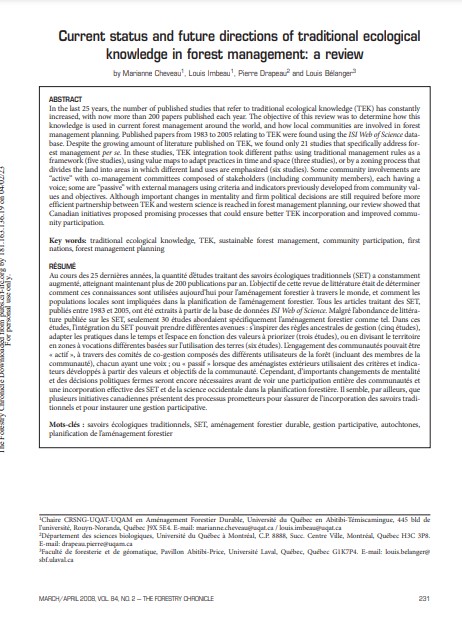Current status and future directions of traditional ecological knowledge in forest management: A review.
Bosque Modelo:
Waswanipi Cree
Temática:
Gestión forestal
Tipo de documento:
Artículo científico
Resumen
In the last 25 years, the number of published studies that refer to traditional ecological knowledge (TEK) has constantly increased, with now more than 200 papers published each year. The objective of this review was to determine how this knowledge is used in current forest management around the world, and how local communities are involved in forest management planning. Published papers from 1983 to 2005 relating to TEK were found using the ISI Web of Science database. Despite the growing amount of literature published on TEK, we found only 21 studies that specifically address forest management per se. In these studies, TEK integration took different paths: using traditional management rules as a framework (five studies), using value maps to adapt practices in time and space (three studies), or by a zoning process that divides the land into areas in which different land uses are emphasized (six studies). Some community involvements are “active” with co-management committees composed of stakeholders (including community members), each having a voice; some are “passive” with external managers using criteria and indicators previously developed from community values and objectives. Although important changes in mentality and firm political decisions are still required before more efficient partnership between TEK and western science is reached in forest management planning, our review showed that Canadian initiatives proposed promising processes that could ensure better TEK incorporation and improved community participation.
Información Bibliográfica
Autor:
Cheveau, M, L Imbeau, P Drapeau and L Bélanger.
Revista:
Forestry Chronicle
Año:
2008
N°:
2
País :
Canadá
Páginas:
231 - 243
Volumen:
84
Idioma:
Ingles
Palabras claves
traditional ecological knowledge, TEK, sustainable forest management, community participation, first nations, forest management planningtraditional ecological knowledge, TEK, sustainable forest management, community participation, first nations, forest management planning





